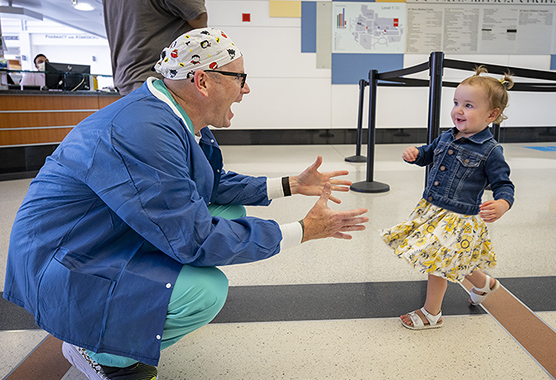Congenital Heart Defects
With our team of pediatric heart specialists at your side, you can have confidence in your child’s care.
Medically reviewed by Jonathan Gil Dayan, M.D. on Feb. 15, 2024.

Dedicated Team to Care for Your Child
Our team of pediatric cardiovascular specialists provides skilled, compassionate care for children with all types of congenital heart defects. We offer advanced treatments in a supportive, child-friendly environment.
Types of Congenital Heart Defects
Congenital heart defects are changes in the structure of your child's heart that develop before birth. They are the most common type of birth defect.
Children can have many types of congenital heart anomalies. They fall into three main categories:
- Blood vessels: Four large blood vessels carry blood to and from your heart. In blood vessel defects, the vessels are too narrow, too large, or do not connect the way they should.
- Heart valves: Heart valves prevent blood from flowing backward. Abnormal valves may be stiff, narrow, misshapen, closed, or leaky, allowing blood to flow backward.
- Septa: The septa are the walls of tissue that separates the left and right sides of your heart. Septal defects are holes in this wall.
Congenital heart defects range in severity from minor to critical. About one-quarter of heart anomalies in babies are critical and need surgery before the age of one.
Babies may also have more than one heart defect at birth. For example, Tetralogy of Fallot involves four anomalies in the heart and surrounding blood vessels.
Symptoms of Congenital Heart Defects
Symptoms of congenital heart defects depend on the type and severity of the heart anomaly. If your child has a mild anomaly, they may not have any symptoms.
Common Symptoms
More severe defects can cause symptoms such as:
- Bluish tint to the nails, lips or skin
- Fatigue
- Dizziness or fainting
- Palpitations (the sensation of rapid or irregular heartbeats)
- Feeding problems
- Heart murmur (a whooshing, irregular sound between heartbeats)
- Rapid breathing (tachypnea) or difficulty breathing
- Shortness of breath (dyspnea), especially during physical activity
Causes and Risk Factors of Congenital Heart Defects
Congenital heart defects occur when your child's heart doesn't develop as it should during pregnancy. The exact cause is unknown, but researchers believe it may involve abnormal changes to certain genes (mutations).
Mutations can occur naturally (spontaneously) or due to environmental factors, such as smoking or medications. In some cases, genetic mutations may be inherited.
There are some factors that can increase a child’s risk for congenital heart defects, including:
Family History
Genetic mutations that cause congenital heart defects may run in families. The chance of a congenital heart anomaly occurring more than once in a family is less than 15%.
Medical Conditions
Certain medical conditions, such as diabetes or rubella (viral infection), can increase your risk of having a child with a congenital heart defect.
Medications During Pregnancy
The use of certain medications while you are pregnant, including some blood pressure and acne medicines, may increase your child’s risk of congenital heart defects.
Smoking During Pregnancy
Smoking during pregnancy is associated with an increased risk of congenital heart defects in children.
Diagnosing Congenital Heart Defects
Your obstetrician may find a congenital heart anomaly during pregnancy using a special ultrasound (fetal echocardiogram). This type of imaging test takes detailed pictures and video clips of your child's heart. Our fetal cardiology specialists offer fetal echocardiograms and provide counseling and care for you and your family.
Physicians also diagnose congenital heart defects after birth, in infancy, childhood or adulthood. To diagnose a heart anomaly, your child’s physician asks about your child’s symptoms and medical and family history. They also do a physical exam and may recommend one or more tests.
We understand medical tests can be frightening for children. Specialists in our Child Life Program work with you and your child to help ease any stress or fear.
Tests May Include:
Echocardiogram
This test uses an ultrasound to detect problems with the heart’s structure and function.
Electrocardiogram (EKG or ECG)
This test measures the electrical activity of your child’s heart.
Cardiac Catheterization
Cardiac catheterization uses a thin tube (catheter) inserted through an artery or vein in your child’s leg or neck to reach their heart. Your specialist takes measurements and pictures to diagnose a heart anomaly. Cardiac catheterizations may also treat some forms of congenital heart disease.
Pulse Oximetry
This test measures the amount of oxygen in your child’s blood.
Exercise Stress Testing
This test assesses your child’s exercise tolerance and their heart and lungs’ responses to exercise.
Treatments for Congenital Heart Defects
Treatment depends on the type of congenital heart defect your child has and how severe it is. Some heart anomalies get better on their own.
In other cases, your child may need treatment to repair a heart anomaly or ease symptoms. At UC Davis Health, you find exceptional care for children of all ages. Offerings include our:
- Fetal Care and Treatment Center provides care for babies with congenital heart anomalies before birth.
- Neonatal Intensive Care Unit offers compassionate, skilled care for newborns who are very ill.
- Pediatric Heart Center provides expert cardiac care for infants, children and teens.
Even with treatment, your child will likely need long-term monitoring and care. Our pediatric heart and vascular team remains by your side, every step of the way, so you and your child get the support you need.
Your child may receive:
Medications
Your child’s physician may prescribe medications to help manage the heart anomaly or related condition. For example, blood thinning medications can prevent blood clotting if your child has an artificial heart valve or heart rhythm problem. There are also medications that can help a child’s heart function or electrical rhythm abnormality.
Cardiac Catheterization
Our specialists painlessly insert a catheter through a blood vessel in your child’s leg or neck to reach their heart. Because cardiac catheterization involves a small incision, your child heals more quickly than with open heart surgery.
Surgery
Our pediatric cardiovascular surgeons have extensive experience and special training to perform complex heart operations. After surgery, your child spends time in our pediatric and cardiac intensive care unit (PICU).
“What are Congenital Heart Defects?” Centers for Disease Control and Prevention (CDC), https://www.cdc.gov/ncbddd/heartdefects/facts.html
"Understand Your Risk for Congenital Heart Defects," American Heart Association, https://www.heart.org/en/health-topics/congenital-heart-defects/understand-your-risk-for-congenital-heart-defects
How many babies does it affect?
8 in 1KHave a congenital heart defect, though most are minor
Source: American Heart Association: The Impact of Congenital Heart Defects
Request an Appointment
As Sacramento's No. 1 hospital, you'll benefit from unique advantages in primary care and specialty care. This includes prevention, diagnosis and treatment options from experts in 150 specialties.
Referring Physicians
To refer a patient, submit an electronic referral form or call.
800-4-UCDAVIS
Patients
Call to make an appointment.
Consumer Resource Center
800-2-UCDAVIS

Ranked among the nation’s best hospitals
A U.S. News & World Report best hospital in cardiology, heart & vascular surgery, diabetes & endocrinology, ENT, geriatrics, neurology & neurosurgery, and pulmonology & lung surgery.

Ranked among the nation’s best children’s hospitals
U.S. News & World Report ranked UC Davis Children’s Hospital among the best in pediatric nephrology, orthopedics*, and pulmonology & lung surgery. (*Together with Shriners Children’s Northern California)

Ranked Sacramento’s #1 hospital
Ranked Sacramento’s #1 hospital by U.S. News, and high-performing in aortic valve surgery, back surgery (spinal fusion), COPD, colon cancer surgery, diabetes, gynecological cancer surgery, heart arrhythmia, heart failure, kidney failure, leukemia, lymphoma & myeloma, lung cancer surgery, pacemaker implantation, pneumonia, prostate cancer surgery, stroke, TAVR, cancer, orthopedics, gastroenterology & GI surgery, and urology.

The nation’s highest nursing honor
UC Davis Medical Center has received Magnet® recognition, the nation’s highest honor for nursing excellence.

World-class cancer care
One of ~59 U.S. cancer centers designated “comprehensive” by the National Cancer Institute.

A leader in health care equality
For the 13th consecutive year, UC Davis Medical Center has been recognized as an LGBTQ+ Healthcare Equality Leader by the educational arm of America’s largest civil rights organization.

